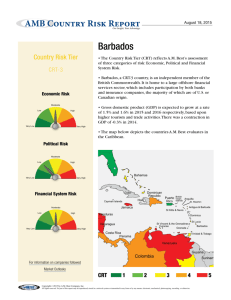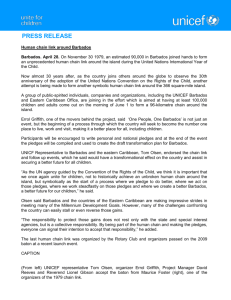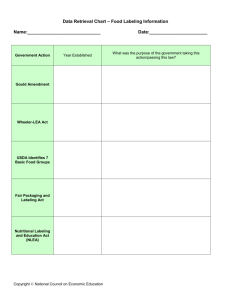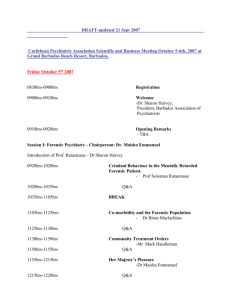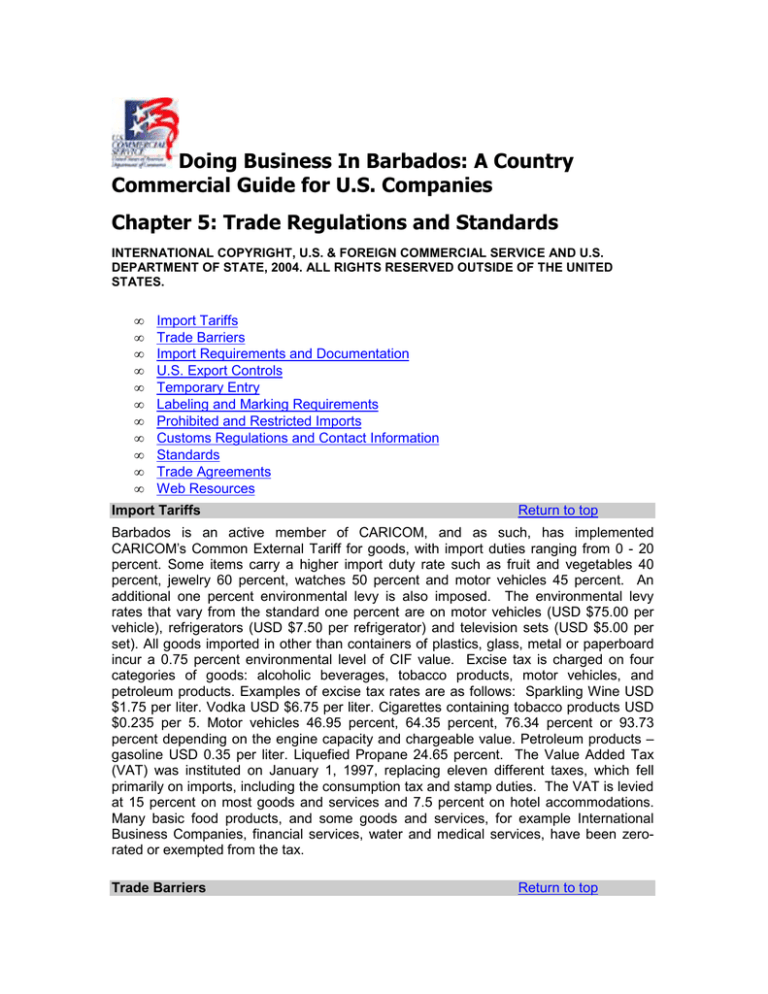
Doing Business In Barbados: A Country
Commercial Guide for U.S. Companies
Chapter 5: Trade Regulations and Standards
INTERNATIONAL COPYRIGHT, U.S. & FOREIGN COMMERCIAL SERVICE AND U.S.
DEPARTMENT OF STATE, 2004. ALL RIGHTS RESERVED OUTSIDE OF THE UNITED
STATES.
•
•
•
•
•
•
•
•
•
•
•
Import Tariffs
Trade Barriers
Import Requirements and Documentation
U.S. Export Controls
Temporary Entry
Labeling and Marking Requirements
Prohibited and Restricted Imports
Customs Regulations and Contact Information
Standards
Trade Agreements
Web Resources
Import Tariffs
Return to top
Barbados is an active member of CARICOM, and as such, has implemented
CARICOM’s Common External Tariff for goods, with import duties ranging from 0 - 20
percent. Some items carry a higher import duty rate such as fruit and vegetables 40
percent, jewelry 60 percent, watches 50 percent and motor vehicles 45 percent. An
additional one percent environmental levy is also imposed. The environmental levy
rates that vary from the standard one percent are on motor vehicles (USD $75.00 per
vehicle), refrigerators (USD $7.50 per refrigerator) and television sets (USD $5.00 per
set). All goods imported in other than containers of plastics, glass, metal or paperboard
incur a 0.75 percent environmental level of CIF value. Excise tax is charged on four
categories of goods: alcoholic beverages, tobacco products, motor vehicles, and
petroleum products. Examples of excise tax rates are as follows: Sparkling Wine USD
$1.75 per liter. Vodka USD $6.75 per liter. Cigarettes containing tobacco products USD
$0.235 per 5. Motor vehicles 46.95 percent, 64.35 percent, 76.34 percent or 93.73
percent depending on the engine capacity and chargeable value. Petroleum products –
gasoline USD 0.35 per liter. Liquefied Propane 24.65 percent. The Value Added Tax
(VAT) was instituted on January 1, 1997, replacing eleven different taxes, which fell
primarily on imports, including the consumption tax and stamp duties. The VAT is levied
at 15 percent on most goods and services and 7.5 percent on hotel accommodations.
Many basic food products, and some goods and services, for example International
Business Companies, financial services, water and medical services, have been zerorated or exempted from the tax.
Trade Barriers
Return to top
Barbados requires that importers obtain permits, licenses or permission from the
relevant authorities for specified products prior to importation. Phytosanitary certificates
are required from the exporting authorities for fresh fruit, vegetables, plants and plant
materials and must accompany the goods declaration before processing is allowed.
Similarly, overseas health certificates must accompany meat and meat products.
Psychotropic and other controlled drugs are subject to licenses from the Ministry of
Health. Additionally, there are a number of other products that must meet obligatory
requirements from the Barbados National Standards Institution.
Import Requirements and Documentation
Return to top
Below are some of the documents that must be presented to customs when goods arrive
in Barbados.
-
-
Airway bills or bills of lading depending on the method of import.
The CARICOM document invoice.
(The Commercial Invoice is acceptable if all of the required information is
present).
The supplier’s invoice documenting all items in the shipment
The C-60 form – a declaration of particulars relating to Customs Value.
A C-63 form - indicating the items shipped, the weight, the shipper, the tariff
code etc. must also be attached.
For exports, the C-63 form is also used. The Commercial Invoice and the relevant
Central Bank forms must also be presented to customs.
When import licenses are required, they must be obtained prior to importation.
The use of a registered customs broker is recommended when preparing export/import
documents.
U.S. Export Controls
Return to top
There are no significant export controls. The United States government maintains export
controls on certain military and dual-use technologies. To find out which items are
regulated, see the following websites.
Directorate of Defense Trade Controls Website: http://www.pmdtc.org
Bureau of Industry and Security Website: http://www.bis.doc.gov/
Temporary Entry
Return to top
Most goods can be brought temporarily into Barbados, though they must be registered
with Customs at the port of entry. Sometimes, a bond must be posted to ensure the reexport of the goods. No bonds are required for used professional apparatus e.g.
television and film equipment. Detailed lists must however be provided to Customs.
Labeling and Marking Requirements
Return to top
The Barbados National Standards Institution publishes the labeling and marking
requirements in their standards regulations. To inquire about the labeling and marketing
requirements for a specific class of goods, contact the Barbados National Standards
Institution at Tel: (246- 426-3870.
Prohibited and Restricted Imports
Return to top
Almost all goods can be imported into Barbados, though some require import licenses,
including many agricultural products. Beer, fruit juices and fruit drinks can be imported
with a license.
Customs Contact Information
Return to top
Her Majesty’s Customs
Mr. Joseph Best
The Comptroller of Customs
Port Authority Building
Harbour Road
St. Michael
Barbados
Tel: 246-430-2310
Fax: 246-430-2370
Website: http://www.barbados.gov.bb/customs/frameset.htm
Standards
•
•
•
•
•
•
•
Return to top
Overview
Standards Organizations
Conformity Assessment
Product Certification
Accreditation
Publication of Technical Regulations
Labeling and Marking
Overview
Return to top
The Barbados National Standards Institution (BNSI) oversees product standards,
labeling, and certification in Barbados. A nongovernmental organization, it was
established in 1973 under the Companies Act as a joint venture between the
Government of Barbados and the private sector. The actions of the Barbados National
Standards Institution were given legal weight by the following acts:
•
•
•
The Control of Standards Act, Cap 326A;
The Weights and Measures Act, Cap 331;
The BNSI Certification Marks Act, Cap 325A.
Since its inception, the Barbados National Standards Institution has been open to
recommendations from the general public and independent groups such as the
Barbados Manufacturer’s Association. It has also been amendable to the incorporation
of regional standards, especially in light of the recent push by CARICOM members to
harmonize regional standards as an important step towards the implementation of the
Caribbean Single Market and Economy. The CARICOM Regional Organization of
Standards and Quality (CROSQ) is the body charged with setting regional standards.
BSNI also works with the Pan-American Standards Commission (COPANT) to address
standards issues as they relate to the Free Trade Area of the Americas.
On August 6, 1997, BNSI accepted the WTO TBT Agreement’s Code of Good Practice
for the Preparation, Adoption and Application of Standards.
Standards Organizations
Return to top
The responsibilities of BNSI include preparing and implementing national standards;
adopting and implementing relevant regional and international standards; revising and
amending standards; assisting in the establishment of new industries; maintaining
testing, investigative and research laboratories; providing calibrating facilities; certifying
products, commodities and processes which meet national standards; and promoting
quality assurance.
There are approximately 151 BNSI Specifications and 21 BNSI Codes of Practice,
approximately 44 of which are mandatory. The mandatory standards relate to health,
public safety, food and environmental protection. A list of mandatory standards can be
found in the BNSI Standards Catalogue.
BNSI maintains an annual standards development agenda, which it submits to the WTO.
Examples of BNSI’s future endeavors are the development of standards for organic
foods, standards for genetically modified foods, and standards for improving medical
laboratories. The harmonization of regional standards is also a near term goal as an
important step towards the implementation of the Caribbean Single Market and
Economy.
There are two other organizations in Barbados charged by law to look at standards for
specific fields. TVET (Technical, Vocational, and Educational Training) looks at skills
that are necessary for various professions and prepares guidelines for training
institutions. FTC (Fair Trade Commission) looks at standards for public utilities.
Conformity Assessment
Return to top
The testing laboratories, which certify that products meet standards, fall under the BNSI
structure.
Product Certification
Return to top
The BNSI Certification Marks Act, Cap 325A bestows the Barbados National Standards
Institution with the authority to certify products and processes, and to issue certification
marks for which a Barbados National Standard exists. BNSI practices a third party
certification system and also accepts third party marks of conformity from other
reputable and well-known agencies. Other marks are accepted on a case-by-case
basis. A firm interested in having a mark accepted must submit the mark and relevant
details to BNSI for assessment.
The procedures for product certification are as follows. The interested party must submit
an application and a non-refundable application fee of BDS$50.00 (USD 25.00) to BNSI.
BNSI will then conduct a preliminary inspection of the manufacturing facility to assess
the testing facilities and the quality assurance procedures for the manufacturing process.
In addition, testing samples are taken to ascertain conformity to a standard’s
specifications. Testing costs are borne by the applicant. After a report of the preliminary
inspection is completed, a scheme of testing and inspection is prepared for the
organization. This scheme includes information such as the points of production from
where samples would be drawn for testing and/or inspection, the frequency, size and
manner of drawing the samples, the tests to be performed, the types of records to be
maintained, corrective actions to be taken if necessary, and the method of applying the
mark. A marking fee, paid by the applicant, is negotiated which covers the costs of the
scheme of inspection.
At this point, a license to use the BNSI mark can be issued. The license is good for one
year and must be renewed annually; there is a BDS$100.00 (USD 50.00) annual license
fee. An application along with a BDS$20.00 (USD 10.00) application fee must be
submitted in order to renew the mark.
BNSI does not have Mutual Recognition Agreements (MRA’s) with U.S. organizations
Accreditation
Return to top
There are currently no laboratory accrediting organizations in the Caribbean. Trinidad &
Tobago as well as Jamaica are looking to form accreditation bodies that can serve the
whole Caribbean. Laboratories in Barbados looking for accreditation will be able to use
these institutions.
Publication of Technical Regulations
Return to top
The BNSI publishes national standards on labeling, building, food, chemicals, textiles,
solar energy, liquefied petroleum gas, furniture, and consumer products. The complete
list of Barbadian Standards is published in the Standards Catalogue.
U.S. entities are free to contact BNSI during the standards development process if they
have any comments.
Labeling and Marking
Return to top
Labeling requirements for different classes of goods are covered by the following
standards.
Mandatory Standards:
•
•
•
•
•
•
•
Barbados National Standard Specification for Labeling of Commodities [General]
(BNS 5:Part 1:1974);
Barbados National Standard Specification for Labeling of Prepackaged Food
(BNS 5:Part 2:1994);
Barbados National Standard Specification for Labeling of All Products
Manufactured from Textiles (BNS 5:Part 3:1974);
Barbados National Standard Specification for Labeling of Prepackaged Goods
(BNS 5: Part 6:1979);
Barbados National Standard Specification for Labeling of Prepackaged Meat and
Poultry Parts/Cuts and Fish and Fishery Products (BNS 5:Part 7:2002);
Barbados National Standard Specification for Labeling of Toys and Playthings
(BNS 23:1976);
Barbados National Standard Code of Practice for Care Labeling of Textiles (BNS
CP 3:1980); and the
Voluntary Standards:
•
Barbados National Standard Specification for Labeling Brewery Products (BNS
186:2000 – ICS 67.160.10).
•
Barbados National Standard Specification for Labeling of Footwear (BNS 5:Part
4: 1980);
To inquire about labeling requirements for a specific class of goods, contact the
Barbados National Standards Institution at Tel: (246) 426-3870.
The following are excerpts from two of the standards describing general labeling
requirements.
A.
Barbados National Standard Specification for Labeling of Commodities (General)
BNS 5: Part 1 : 1974 (Reprinted 1996)
(The following is a direct quote from the Standard for Labeling of Commodities.)
Labeling Requirements
1.
A label affixed to, or marked on, or accompanying a commodity or its packing
shall conform to the following requirements;
1.1 It shall give a description of the commodity and shall provide adequate factual
information to the potential purchaser.
1.1.1
This shall include either the weight or volume or measurement or size as
applicable.
2.
It shall, if necessary, provide a purchaser with appropriate safety instructions.
3.
It shall, if necessary, provide a purchaser with operating instructions and
information on care and maintenance.
4.
It shall provide adequate information to enable both manufacturer and
supplier to be easily traced.
5.
It shall provide adequate information relating to the country of manufacture.
6.
It shall be legible and durable up to the point of sale, and, where appropriate,
during the normal working life and use of the commodity.
7.
It shall not contain information that is false, misleading or deceptive, or is
likely to create an erroneous impression regarding its character in any
respect.
8.
It shall not contain information by words, pictorial or other devices which refer
to or are suggestive, either directly or indirectly, of another commodity with
which such a commodity might be confused, or in such a manner as to lead
the purchaser or consumer to suppose that the commodity is connected with
such other product.
9.
The information specified in 2 and 8 above, shall be in the national language
of the country where the commodity will be marketed.
In the event of any apparent conflict between this specification and a supplementary
specification, the latter shall prevail.1
B.
Barbados National Standard Specification for Labeling of Prepackaged Goods
BNS5 : Part 6: 1979 (Reprinted 1999)
(The sections in the following excerpt from the Standard for Labeling of Prepackaged
Goods are summarized where indicated.)
General Requirements (Summary)
Each package shall be labeled with the following information:
1. the common name of the good, the manufacturer’s address, and the country
of origin;
2. a correct statement of the net contents of the package;
BNSI, %DUEDGRV1DWLRQDO6WDQGDUG6SHFLILFDWLRQIRU/DEHOLQJRI&RPPRGLWLHV*HQHUDO,
BNS 5: Part 1 : 1974 (Reprinted 1996), pp.4-5
1
3. an accurate description of the major ingredients or components of the goods;
4. an expiry date or date mark indicating the age of the goods.
Prevention of Deception (Summary)
A label on a package of prepackaged goods may contain other information,
designs, symbols or pictorial matter, provided that no words, pictures, or other
markings of the label are used to give an erroneous impression of the net
contents of the package; the ingredients or components of the goods; the nature,
origin, quality, performance, function, and method of manufacture of the goods;
country of origin; the price or unit price of the goods; and the ease of
maintenance or repair of the goods.
Position of Information on Package or on the Goods (Summary)
The information required by the General Requirements shall be place on the
principal display panel of the package.
Exemptions for Certain Retail Sales
Goods which are repackaged by the retailer need not be labeled with the
information required by the General Requirements so long as they are sold or
displayed or exposed for sale in close proximity to a notice, card, or statement in
clearly discernible lettering containing the information required by the General
Requirements.
Language to be Used on Labels of Prepackage Goods (Summary)
All statements shall be in the English language except where the common name,
manufacturer’s name, or address is in another language. All numbers shall be in
Hindu/Arabic numerals or words.
Information as to Retail Price or Unit Price (Summary)
A label may include the price of the goods in the package. If the price is not on
the label or package, the price shall be clearly displayed in proximity to the
goods. If packages containing the same goods are not uniform in net contents,
the packager or retailer shall mark each package so that each label includes the
unit price of the goods as well as the net content and price of each package. In
the event of a price decrease or sale/discount, the old and new prices shall be
stated in equal size and style.
Information as to Retail Price or Unit Price (Summary)
A label may include the price of the goods in the package. If the price is not on
the label or package, the price shall be clearly displayed in proximity to the
goods. If packages containing the same goods are not uniform in net contents,
the packager or retailer shall mark each package so that each label includes the
unit price of the goods as well as the net content and price of each package. In
the event of a price decrease or sale/discount, the old and new prices shall be
stated in equal size and style.
Warranties or Guarantees
No reference shall be made on a label or on a package to any warranty or
guarantee for any goods unless a copy of the warranty or guarantee is given to
the purchaser or consumer at the time he take possession of the goods.
Presentation of Information (Summary)
All information required by this standard shall be readily discernible under normal
conditions of sale. Where the common name of the good or manufacturer’s
name, address or country of origin consists of more than one word, the letters
shall be of identical size and style.
Date Marking and Expiry Dates (Summary)
Where goods are liable to deteriorate within a period of six months after the date
of manufacture or packaging so that the quality, safety or other desirable
characteristic is not likely to be maintained, a date mark shall be placed on the
goods, label or package.
Instructions for Use and Information on Source for Spare Parts (Summary)
Where any risk to the consumer or user or where significant deterioration of the
goods may result if the goods are not properly handled, stored, transported,
used, installed, cared for, maintained or repaired, appropriate hazard symbols
and instructions for use in English shall be provided on the label or package or
accompanying the goods.
Use of Standard Mark (Summary)
1.
The use of a Standard Mark issued by the Barbados National Standards
Institution shall be governed by the laws of Barbados.
2.
The use of a Standard Mark issued by a Standards Organization outside
of Barbados shall be in accordance with the rules or laws governing that
Standard Mark applied by the Standards Organization.
3.
No manufacturer or packager shall use a standard mark on a label, on a
package, or on goods without written authorization in accordance with the
laws or rules referred to in 1 and 2.
Note: the following bodies in the Caribbean Community issue standard
Marks:
(a) Barbados
BNSI
(b) Jamaica
JBS
(c) Trinidad & Tobago
TTBS
In the event of conflict between the provisions of this standard or any Barbadian
Standard for labeling of classes of goods, which are sold prepackaged, the latter shall
prevail.2
Contact Information:
Barbados National Standards Institution
Dudley Rhynd, Director
Flodden
Culloden Road
St. Michael
Barbados
Phone: 246-426-3870
Fax: 246-436-1495
Email: bnsi@caribsurf.com
Website: http://www.commerce.gov.bb/Agency/BNSI/default.asp
The Pan American Standards Commission or La Comisión
Panamericana de Normas Técnicas (COPANT )
Dudley Rhynd, Vice President
Manuel Díaz Portocarrero, Executive Secretary
Email:copant@cantv.net
Website: http://www.copant.org
Ministry of Commerce, Consumer Affairs and Business Development
Reef Road
BNSI, %DUEDGRV1DWLRQDO6WDQGDUG6SHFLILFDWLRQIRU/DEHOLQJRI3UHSDFNDJHG*RRGV
BNS5 : Part 6: 1979 (Reprinted 1999), pp. 7-12
2
Bridgetown
St. Michael
Barbados
Phone: 246-427-5270 Fax: 246-431-0056
CARICOM Regional Organization for Standards and Quality (CROSQ)
Dr. Omer Thomas, Chairman
(Exec. Dir. of the Bureau of Standards Jamaica)
6 Winchester Road
Kingston 10
Jamaica
Phone: 876-926-3140-5
Fax: 876-929-4736
Embassy’s Point of Contact on Standards - Commercial Specialist Doreen Weekes’
email: doreen.weekes@mail.doc.gov
Trade Agreements
Return to top
As a signatory of the WTO TBT Agreement, Barbados follows the Agreement’s Code of
Good Practice for the Preparation, Adoption and Application of Standards. BNSI serves
as the WTO Inquiry Point and notifies the WTO of its development agenda.
For the most part there have not been significant technical trade barriers due to
compliance problems. In order to facilitate international trade, Barbados tries to remain
close to international standards. Some of the BNSI mandatory standards are based on
CODEX standards. However there have been a few issues. For example, in Barbados
it is mandatory to use the international dating system to express the used-by date on
products. As American companies do not use the international dating system, the
importation of certain products, such as canned foods, has encountered problems in the
past.
Web Resources
Return to top
The Pan American Standards Commission or La Comisión Panamericana de
Normas Técnicas (COPANT ) Website: http://www.copant.org
Directorate of Defense Trade Controls Website: http://www.pmdtc.org
Bureau of Industry and Security Website: http://www.bis.doc.gov/
Barbados Customs & Excise Department Website:
http://www.barbados.gov.bb/customs/frameset.htm
Barbados National Standards Institute Website:
http://www.commerce.gov.bb/Agency/BNSI/default.asp
U.S. exporters seeking general export information/assistance or country-specific commercial
information should consult with their nearest Export Assistance Center or the U.S. Department
of Commerce’s Trade Information Center at (800) USA-TRADE, or go to the following website:
http://www.export.gov.
To the best of our knowledge, the information contained in this report is accurate as of the date
published. However, The Department of Commerce does not take responsibility for actions
readers may take based on the information contained herein. Readers should always conduct
their own due diligence before entering into business ventures or other commercial
arrangements. The Department of Commerce can assist companies in these endeavors.


